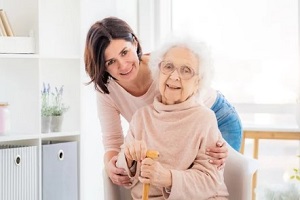 When adults get older, most of the attention turns toward properly taking care of them and ensuring that they can remain in the home for as long as possible. However, among all of these conversations about the needs and health challenges of the aging parents, very little attention is often paid to the family caregivers who are usually the children of those aging parents. They often need an outlet and wisedom from those who are going through or have experienced similar experience, that why a caregiver support group is so important.
When adults get older, most of the attention turns toward properly taking care of them and ensuring that they can remain in the home for as long as possible. However, among all of these conversations about the needs and health challenges of the aging parents, very little attention is often paid to the family caregivers who are usually the children of those aging parents. They often need an outlet and wisedom from those who are going through or have experienced similar experience, that why a caregiver support group is so important.
If you are a caregiver for an older family member, you are likely facing unique challenges and having difficulty navigating this new role alongside working toward your goals for family life and time to yourself. A caregiver support group can teach you to cope with caregiving in a healthy way. Here are some of the ways that a support group can help you with aging parents.
Offers Hope
One of the most common complaints that caregivers offer when discussing their personal challenges is that they feel hopeless. You probably have some anxiety or overwhelming feelings attributed to fearing that “this is your life now,” and that you will never return to a semblance of normalcy, or achieve the goals you had planned.
Caregiver support groups can show you the reality of how situations with aging parents work to give you hope about your future and how you can achieve a better balance.
Provides Education
Offering medical and social care to your aging parent requires some level of knowledge, and many families pick up on that through trial and error which can be both uncomfortable and frightening for all parties involved.
Caregiver support groups equip you with the tools that you need to properly care for your family member by offering education. Some even provide important tools such as a CPR certification preparing you to be more equipped for dangerous situations.
Creates Catharsis and Solidarity
Studies have shown that across experiences, a feeling of solidarity improves mental health outcomes for those who are facing significant challenges. Caregiver support groups provide a communal resource where you can speak with others who are going through situations similar to yours.
The catharsis that comes from understanding you are not alone is something that many families find empowering, and they feel that they have resources and support outside of themselves to help them keep going.
Teaches Coping Skills
The biggest challenge that family caregivers report when discussing the care they provide for their aging parents is how to cope with the new level of responsibility. This comes in many forms with anxiety and depression being large factors.
Caregivers are prone to mental health challenges because they are overwhelmed, overworked and cannot escape from their responsibility. Caring for an aging parent is different from simply having a job, because odds are the parent lives in the home 24/7. Caregivers cannot simply leave their “work at work”, and there is minimal time to decompress.
Similarly, many caregivers find themselves stressed and discouraged by the changes to their family life. They may no longer have time to spend with other loved ones or children, or they may not be able to do so without including the aging parent, which dramatically changes which activities are viable in the first place.
Caregiver support groups teach carers how to create boundaries and maintain the lives they want to live without threatening the health and wellbeing of their older family members. Fixing boundary issues often largely or entirely resolves mental health challenges related to caring as well.
Fosters Connections for the Parents
 While caregiver support groups are mainly focused on assisting the people who are providing the care, the aging parents who are being cared for can benefit as well—although indirectly for the most part.
While caregiver support groups are mainly focused on assisting the people who are providing the care, the aging parents who are being cared for can benefit as well—although indirectly for the most part.
Caregiver support groups are useful places to learn about community resources and foster connections that can improve the health outcomes of the parent. That might include learning of in-home care services to give your family a break or discovering activities geared toward seniors that others in your group are using with great success.
These connections can help your loved one to thrive, even in a home care environment, allowing enrichment and improved health outcomes. Other members of the support group as well as staff may be able to point you in new directions.
Get Help from a Local Aging Resource
If you are faced with the responsibility of caring for an aging parent, a caregiver support group could be a vital element in your and your family’s well being. The Shepherd’s Center of Northern Virginia helps older adults to age in place by connecting families with the resources, communities and services that they need to thrive. Reach out to learn more about how we can help you to care for your loved one in a holistic way that preserves your own autonomy.
